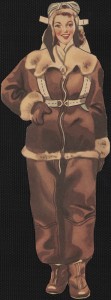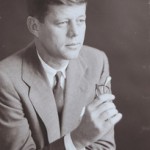Written by Patricia Feeley


The holiday season was celebrated at Digital Commonwealth by adding some interesting collections. Our biggest contributors, Boston Public Library and the University of Massachusetts/Amherst, of course, did their bit. But let’s highlight our other two contributors.
The Jamaica Plain Historical Society performed a good deed for all Bostonians by sponsoring the digitization of the Doyle’s Café memorabilia. When that 137-year-old institution closed in October 2019, many of the pub’s decorations and ephemera were auctioned off. JPHS made sure a record was made before they all disappeared into private collections. Thank you!
The Lawrence Public Library has been a frequent and welcome contributor. This month’s collection, the Phyllis Tyler Paper Doll Collection, is another set of seldom seen ephemera. If the fashions didn’t give away the fact that this set is from the 1940’s, the celebrity dolls – Betty Grable and Ava Gardner – would. Perhaps most striking is the WAFS (Women’s Air Force) pilot dolls in both military and mufti (left and right respectively). Yes, women did their bit in World War II, too.
My very first post on the Digital Commonwealth blog was an interview with Louise Sandberg of the Lawrence Public Library. She was knowledgeable, encouraging and funny. She was a perfect first interview. I’ve interviewed other members since and they have been universally enthusiastic about their collections and digitizing through DC.
I am grateful to all of them, although maybe a little more grateful to Alison Basset and Sarah Hayes of the Trustees for introducing me to one of my favorite images (Studio portrait of unidentified woman in black dress and monocle with cigarette posing with Great Dane; whip and globe on floor, which has as great a backstory as it is a photo.) and to Dick Rowley of the Granville Public Library, a dedicated correspondent and proof, if you need it, that a small library can have a big impact thanks to social media crowdsourcing, the Granville Historic Image Library, partnering with local history organizations and more.
It’s been an honor to be editor of this blog for three years and it is a joy to know I’m passing the editorship on to someone who loves the collections and finds our members just as fascinating as I did. (Good luck, Anne!)
You were all inspirational to me. I hope I did you some justice in these postings.
Boston Public Library
Paintings and Fine Arts Collection at the Boston Public Library – 10 items added to existing collection
Jamaica Plain Historical Society
Doyle’s Cafe Memorabilia – 111 items
Lawrence Public Library
Phyllis Tyler Paper Doll Collection – 258 items
University of Massachusetts Amherst Libraries Special Collections and University Archives
27 new collections; 23,055 new items re-harvested
